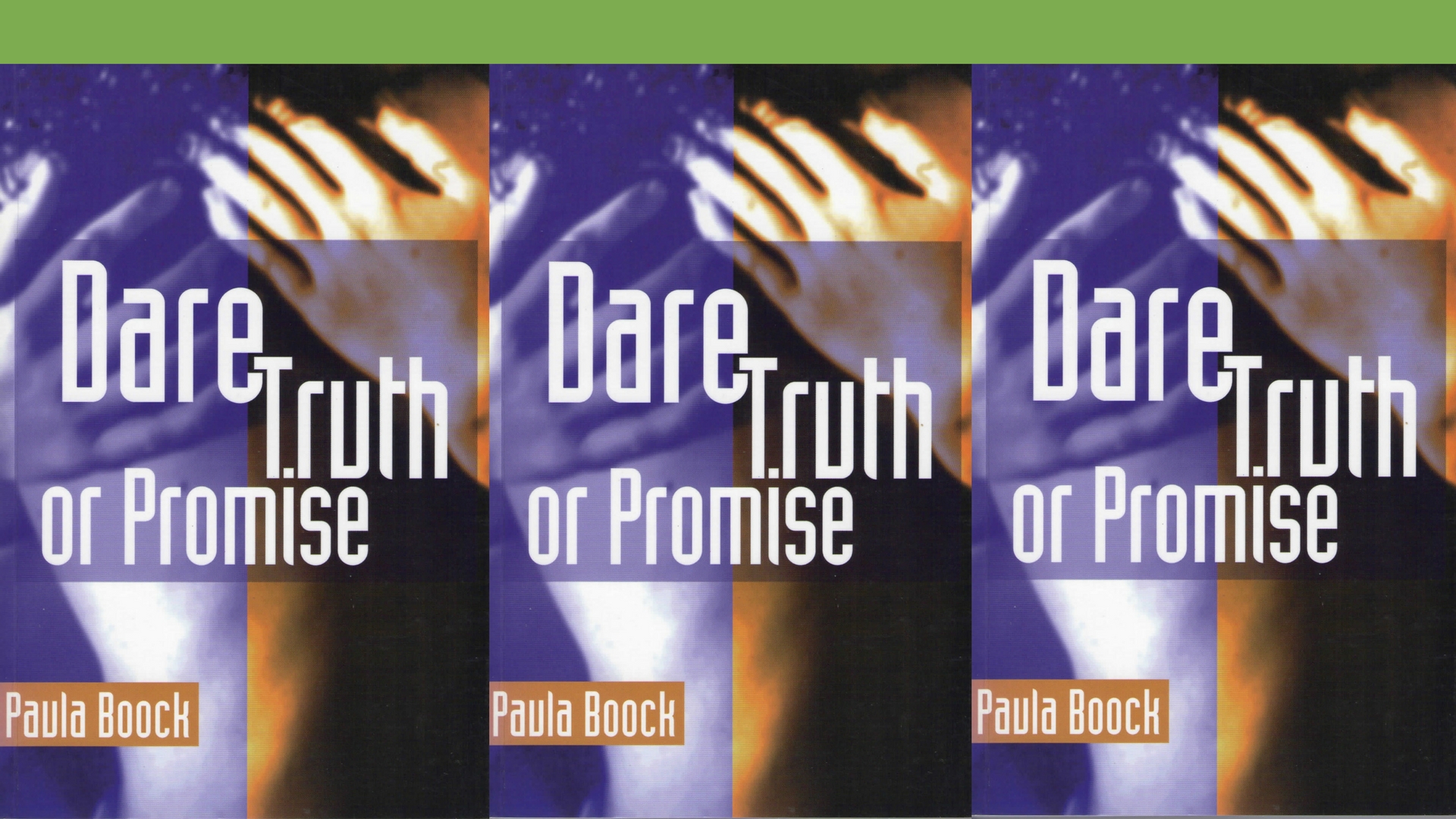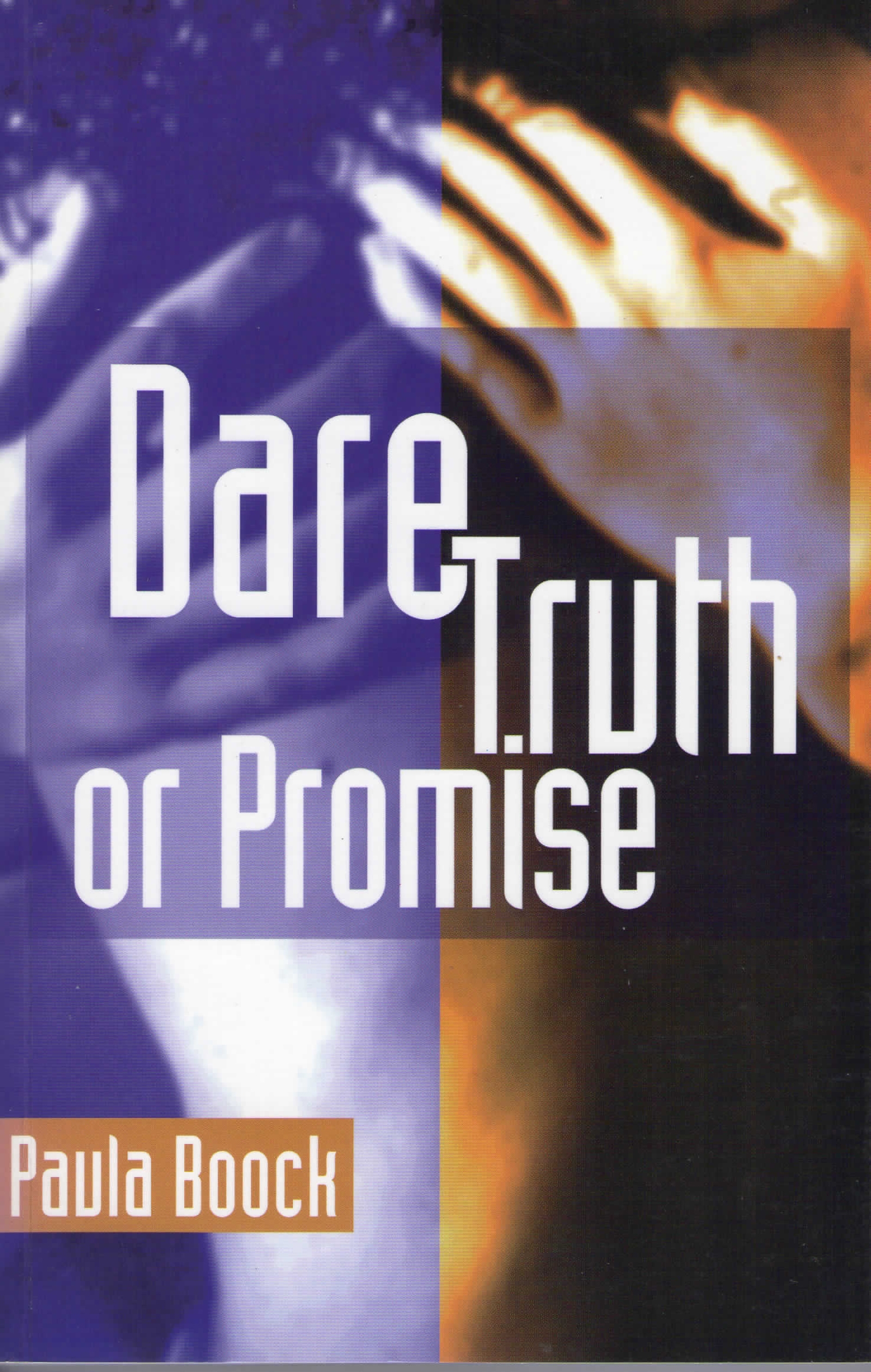Today we say ‘Happy Birthday!’ to Paula Boock’s ground-breaking novel for young adults, Dare Truth or Promise, published on this day, twenty years ago. Today Gem Wilder remembers how important it was for her to read as a teenager, and reflects on its ongoing significance.

It was teenage rebellion that brought me to Dare Truth or Promise.
I was a surly high schooler, fairly stereotypical in my angst – though it felt unique at the time. I was at a Catholic girls’ school that my parents had insisted my three older sisters and I attend. It was the kind of school with strict uniform codes and a fairly authoritarian rule. One was expected to conform. Joiners were celebrated; misfits were quashed.
One evening in 1998, I was watching the six o’clock news when our principal appeared on screen. Paula Boock had just won the New Zealand Post Children’s Book Awards Book of the Year, and there was my principal, talking about how our school library would most certainly not be stocking the winning title.
No one else seemed to care, but I was livid. How dare she deny us an award-winning book! Nobody told me what I could or couldn’t read! And so, in an act of quiet protest, I decided then and there that I was going to buy myself a copy. And I did. I used my measly and precious supermarket wages, bought myself a copy, and read it (probably when I was supposed to be doing my homework).
Nobody told me what I could or couldn’t read!
Dare Truth or Promise tells the story of Louie and Willa, students at the fictitious Woodhaugh Girls’ High, who fall in love. Willa lives above a pub run by her mother. She has had one prior relationship with a girl, which ended badly, forcing her to transfer to Louie’s school. Louie’s parents are present in a way that often feels overbearing to teenagers keen to embrace independence.
In its pages I found familiarity. I think it was the first New Zealand book with a contemporary setting I had read. I’d gone through the Alex quartet by Tessa Duder, but that was set in the 1950s and 1960s. I’d devoured Maurice Gee’s Halfmen of O trilogy, but most of that series takes place on another planet, or an alternate universe. Not like the suburban North Dunedin of Dare Truth or Promise, which I recognised from family vacations to visit my grandparents in North East Valley.
And I recognised myself in Louie and Willa. In Louie I could relate to the pressures she felt from her family, her parents. The desire to spread her wings while still feeling bound by their rules. I understood Louie’s desire to be seen as successful, and that success to her was being smart, and fitting in. Acceptance equalled success in Louie’s eyes. In Willa I recognised rebellion, the acknowledgement that actually, she didn’t fit in, and didn’t want to. But in order to survive she was going to keep her head down and fly under the radar, to avoid bringing any more drama to her life, as it’s hinted happened at her previous school, with her relationship with the mysterious Cathy. She just wants to get high school over and done with, so she can move on to living the life she really wants. I admired her strong ethics, and envied her ability to stick to them in the pressures of a high school environment.
…I recognised myself in Louie and Willa.
And she lived above a pub! What teenager doesn’t think that’s glamorous? Of course now I know how awful that would have been, especially in those days when pubs were filled with the stench of cigarette smoke as well as stale beer. But to 17-year-old me, it just sounded really cool.
In both girls, I recognised their fear. In the same year that Dare Truth or Promise was first published, 1997, Ellen DeGeneres publicly came out on the cover of Time magazine. Shortly thereafter, so did her sitcom character, Ellen Morgan, in an episode watched by 44 million people. The episode won a Primetime Emmy Award for Outstanding Writing for a Comedy Series. Even so, the show was cancelled within a year due to a drop in ratings.
This was before the Civil Union Act of 2004, and before marriage equality and adoption rights for same-sex couples in 2013. Before Glee. Before YouTube celebrities like Troye Sivan, Ingrid Nilsen, Alexis G. Zall, Hannah Hart, and so many more, posted their coming out videos. The internet can offer community for queer teens who might not find that support in their homes. It can answer their questions, and be a vital tool in showing them the rights, struggles, and victories of the international LGBTQ+ community. It can make them feel less alone.
Earlier this year a friend of mine posted this about pride flags:
‘IDK about other queer kids but walking past houses flying pride flags feels like the universe holding my hand for a little minute.’
Reading Dare Truth or Promise as a queer-teen-in-denial felt like the universe holding my hand for a little minute. When my Principal was telling us we couldn’t bring a girl to the seventh form formal because ‘We need even numbers of girls and boys,’ Dare Truth or Promise was there, at the back of my mind. Paula Boock had my back.
Reading Dare Truth or Promise as a queer-teen-in-denial felt like the universe holding my hand for a little minute.
And god, that airport scene! Before Willa and Louie have acknowledged their feelings for each other, they head to the airport, where they stand at the end of the runway as a plane takes off over them. This is where they kiss for the first time, and I don’t know that I’ve ever read a more accurate portrayal of first love, first kiss, the adrenaline of falling head-over-heels crazy in love with someone, of giving in to the wild, being swept up in the emotions and the hormones and the ecstasy of it all. It really is like a plane taking flight, your stomach lurching, the rules of gravity seemingly disappearing like magic.
It’s not all whirlwind romance though. Willa and Louie keep their relationship a secret throughout much of the book. Willa, because she’s already been on the receiving end of some pretty ugly homophobia. Louie, because she rightly suspects that her mother is not keen on the idea of her daughter being a lesbian.
When Louie opens up to her best friend Mo about her relationship with Willa, Mo says:
‘I just never knew. How could I have never known?’
To which Louie replies ‘I never knew. Well, not properly.’
You don’t know, properly, until you do.
I read Dare Truth or Promise, and in my most nonchalant teenaged way, sneered about how it wasn’t a big deal. What was the fuss? What did it matter? Yeah, so they were lesbians. So what?
But it mattered. It mattered that 20 years ago, when I didn’t even know I needed it, someone was telling me it was okay to be queer. Someone was showing me exactly what that meant. Paula Boock, and Willa and Louie, showed me who I was, and also who I wanted to be, who I could be.
Paula Boock, and Willa and Louie, showed me who I was, and also who I wanted to be, who I could be.
Like other queer parents, I hope that things are better for our children and their peers. My own daughter has a copy of Promised Land on her bookshelf, a fairytale where a farm boy and a young Prince fall in love. For her friend’s upcoming birthday we have got him a retelling of Sleeping Beauty, where the titular character lives with her lesbian aunts, and is rescued from her long slumber by a teenage girl.
I cast my mind back to the books of my own childhood, trying to remember any queer characters I’d come across prior to Louie and Willa. The only ones I could think of were the Professors who board in the Fossil household in Noel Streatfeild’s Ballet Shoes, yet their relationship was written so subtly that I was an adult before I realised the truth of their situation.
Twenty years have passed, but Dare Truth or Promise is still as important as ever.
I hope queer kids today are still finding their way to this book. LGBTQ+ representation is so much more visible and celebrated than it was twenty years ago, but homophobia is still rampant in our societies.
I hope queer Australian teens are reading Dare Truth or Promise as the Australian Marriage Law Postal Survey asks: ‘Should the law be changed to allow same-sex couples to marry?’ As their country votes on whether or not they will be legally allowed to marry their future partners, I hope they too feel the reassurance that Dare Truth or Promise offered me as a teen.


Gem Wilder
Gem Wilder is a Wellington writer whose work has been published in and performed at many places, including The Spinoff, The Sapling, Sport, Is It Bedtime Yet?, Enjoy Gallery, The Dowse, Wellington Museum, and LitCrawl.



